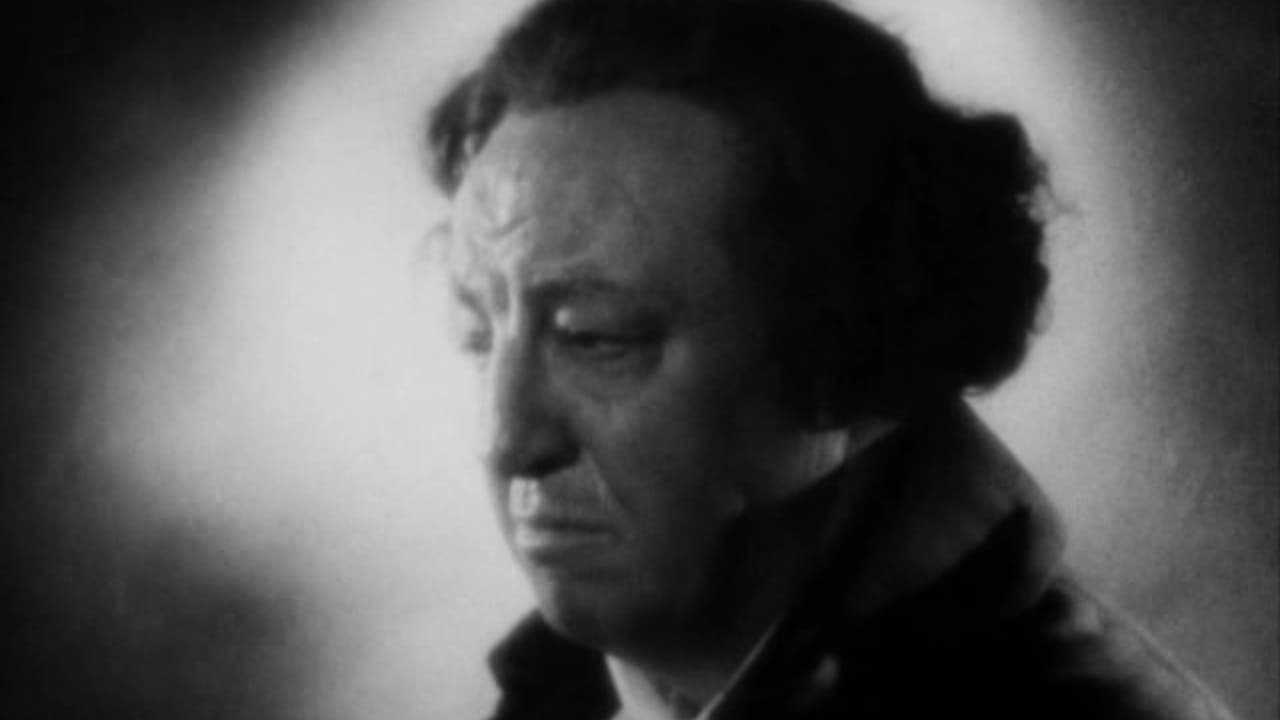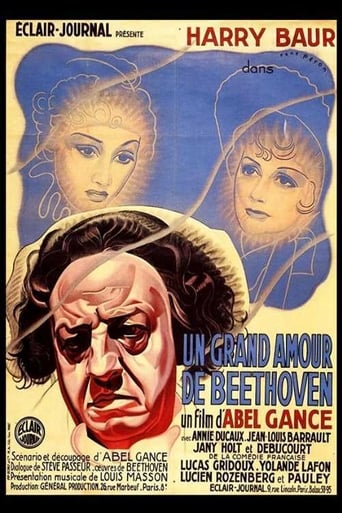



Well Deserved Praise
It’s an especially fun movie from a director and cast who are clearly having a good time allowing themselves to let loose.
View MoreThis movie feels like it was made purely to piss off people who want good shows
View MoreThere's no way I can possibly love it entirely but I just think its ridiculously bad, but enjoyable at the same time.
View MoreA disaster of a film. Everything is wrong. Nothing works, except the costumes, the one thing in the film which deserves admiration. Beethoven himself is totally unconvincing as a big fat lurch, while in reality he was small and inconspicuous. The intentions of the film are honest and good enough but fail miserably. The invented story is illustrated by the master's music, but the constant repetition of the first bars of the fifth symphony to point out the call of Beethoven's destiny becomes annoying for its debility. The film consists of exaggerations which spoil any possibility of any dramaturgy or realism. The final death scene is unbearably painful, since he never seems to die. The women cry incessantly all through the film turning it into a sentimental mess. They deserve better credit though than Harry Baur as Beethoven for at least being pretty and nice to look at. This is one of the most awkward films I have seen, perhaps though biased by the deeply convincing impression made by the outstanding Beethoven film with Gary Oldman 1994, a completely different version of "The Immortal Beloved" and also a total fake, but so much better and even realistically convincing. This effort to enthrone Beethoven as some kind of divine icon ("I believe in God and in Beethoven." - Richard Wagner, the motto of the film) is a total bathos of a turkey, and the intended apotheosis is only growing constantly more pathetic all the way. There are some sparkling moments, though, where Abel Gance's genius in spite of all succeeds in shining through, in fact, all the actors except Beethoven are quite good, especially the young Jean-Louis Barrault as the dashing nephew, but even in that case the film fails in making something out of the Beethoven drama. In reality, his nephew Karl tried to commit suicide, which was Beethoven's final spiritual death blow. It is not even hinted at here, and yet the film pretends to tell the story of Beethoven. It IS the story of Beethoven, but Beethoven himself is missing, and there is nothing in it but Abel Gance's absurdly vain pretensions. Sorry, any Beethoven film is better than this one.
View MoreAs a rule biopics of composers have a tough time pleasing everyone; purists kvetch about chronological lapses, music lovers feel short-changed and the neutrals feel that less music and more story - fabricated or not - would be better all round. Having said that Abel Gance has made a very decent fist of Beethoven's life and work, helped considerably by having one of the finest actors in the business - in France or elsewhere - Harry Baur in the lead role. For some bizarre reason Gance is thought of as a 'silent' director as if he'd his career had come to a halt with the advent of sound, a sort of directorial equivalent of John Gilbert, whereas he made several excellent sound films, not least this one. For 1936 he uses some adventurous techniques not least the 'Disney' birds, lined up on a branch singing their hearts out to a Beethoven unable to hear. Today we may feel that Gance overdid the transition from silence to sound as he switches back and forth between Beethoven's and a general viewpoint but in 1936 it was the perfect visual image to illustrate the profound loss suffered by a genius. This movie, in black and white though it is, towers above such jokes as Stewart Granger's Paganini (The Magic Bow) and Dirk Bogarde's Liszt (Song Without End) and as for the blood on the keys in Cornel Wilde's Chopin (A Song To Remember) do we really want to go there. This is one that will take some beating.
View MoreThere are not many filmed biographies dedicated to the Music master of all times, the latest being "Beethoven in Love" (which is Hollywoodiana at its worst).In Abel Gance's version, "Un Grand Amour de Beethoven", not only do we find some of the best French actors of an Era long gone, but we have a true effort at character study.Like in the Austrian movie, which nowadays is practically unavailable, called "Eroica", another excellent example of a screen translation of the man's life, "Un Grand Amour..." is a fair attempt at giving us Beethoven, the man, not the lover, not just the composer, but a man in his time.In this one, somebody may still ask himself if Beethoven's love went to women, to a particular woman, or to a simple and probably more logic choice, to his music. But there is more. The man's interior struggles are shown.In a time period in which Revolutionary thinking seemed to permeate society, Beethoven comes through as the German "revolutionary" composer he was.Beethoven craved for human love like any other human being, but in the end, as the realist he was, and viewed the handicap he was facing, deafness, he concentrated totally and exclusively to his music.In this movie, one can see that struggle for love, but instead of being a defeat to Beethoven (as in the above mentioned trashy movie), the man turns it into a triumph over the senses and brings himself, as well as his own music to an apotheosis never since equaled by any other composer. Abel Gance seems to have understood this and respecting the genius of another master of the artistic trade, delivers a very touching account of the master's life.The only downside to this effort is the poor technology filmmakers had in those days. At times the sound is dreadful and some conversations can only be understood by reading the subtitles (mind you, I speak French fluently, but I still could not understand some passages).The music is hauntingly beautiful, but lacks depth and roundness. Poor Abel Gance, he must have struggled hard to finance this project. Despite these flaws, this is, together with "Eroica" (if one can find it), the only true effort made, at bringing the great master back to life.Being a theatrical director and an actor myself, I am still hoping to be able to, one day, put together some music historians, a dignified cast and crew and start what I always wanted in my childhood: film the entire life of Ludwig van Beethoven, according to his own letter exchange and the biographies of his closest friends and admirers.Beethoven needs and deserves a faithful reconstruction of his life, told to generations to come. He was more than just a musical genius. He was a highly controversial historical, philosophical and revolutionary/reactionary figure.Abel Gance's effort is just a tiny cut in Beethoven's life and by reducing it into a two hour effort, he just partially managed to expose the man behind the composer, turning it naturally, as one would expect from a master such as he was and still is, into a masterpiece.And yet, it is still lacking amplitude. Nevertheless, this movie is a must for every Beethoven fan, if not of master Abel Gance.Let's hope to find soon a larger and better product than "Bethoveen in love".
View MoreFollowing the incredible silent masterpiece "Napoleon," Abel Gance created another magnificent work of art in 1936, this time focusing on the brilliant composer Ludwig van Beethoven.While the film is filled with the creative camera work that characterized the style of Abel Gance, it goes one step beyond that of any of his previous works. It combines beautiful musical interludes with imagery that not only describe specific historical and biographical events in Beethoven's life, but also evoke the opposing inner emotions of happiness and anguish that troubled the deaf Beethoven during the prime of his life.Abel Gance's "Beethoven" is a perfect example of how the marriage of picture and sound can be used perfectly to form a creative masterpiece.
View More